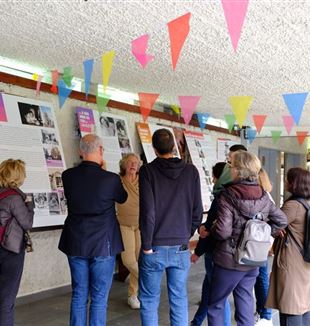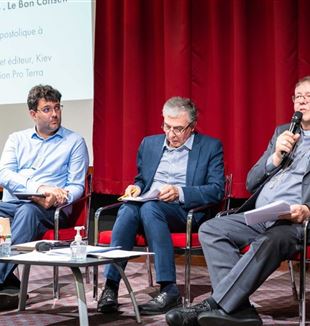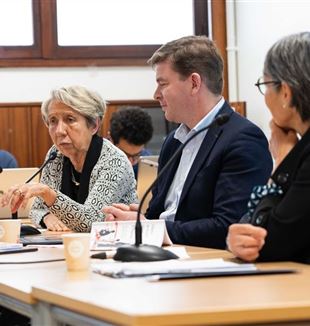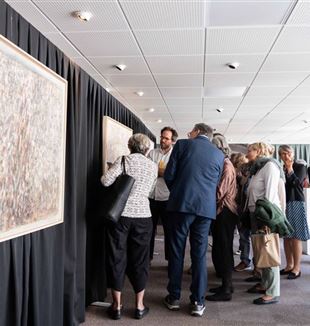
The bridges of Paris
The first edition of the Forum Paris, a ‘meeting’ that was born from the spark of the “prophecy for peace”, to the surprise of the Pope's greeting for the event. Art, dialogues on current events, and the desire to encounter everyone.Friday, May 24, 2 p.m.: There is heavy traffic in Paris as an unusual trio – a mathematician, an architect and a cook – try to get from one side of the Seine to the other in a car loaded with food and drink. What brought them together more than a year ago was a desire to find out whether the ‘other’ – a friend, colleague, spouse – really is a good for life, or just an obstacle to one’s fulfilment.
Their destination was the Patronage of the Bon Conseil, a kind of oratory/cultural center, for the two-day event of meetings, exhibitions, concerts, and coexistence that they had organized. It was the first edition of the “Forum Paris - Building Bridges,” whose title was inspired by the French poet Yves Bonnefoy's phrase “The relationship with the other as the origin of being.”
Upon their arrival, a small group had already been working since that morning to prepare the exhibition “The Encounter: the path of artistic creation,” an exhibition of selected works by artists Marie Michèle Poncet and Manfredi (Dino) Quartana. It was an exhibition with no explanatory texts, but was silent, with only quotes from artists and philosophers so that the viewer would stand in front of the works and “not miss the encounter” (Jean-Pierre Lemaire). The exhibition spoke of a great friendship between the two artists, which continues with those who prepared and constructed it. The result, besides being poignantly beautiful, continues to pervade these relationships, which grew in the creation of the exhibition itself. “The encounter with these works and those who made them can thus become, for us and for everyone, an occasion for a new gaze” (Introduction to the exhibition catalog).
At 7 pm, the event began with an aperitif that was surprising to see. Not everything worked well, but even the difficulties were faced together because the stakes were high: discovering the convenience of relationships, discovering if my heart is open, discovering what I am made of. The guests enjoyed the late sunshine as the exhibition on Takashi and Midori Nagai, skirting the cloister, became a point of attraction. The guides were hard at work. They had come from all over France and had worked for months with Paola Marenco, a hematologist and co-founder of the Friends of Takashi and Midori Nagai Association, to build this moment. Seeing them enthusiastically explaining the exhibition was a joy.
The inaugural meeting then took place. The hall filled up quickly, while Pope Francis' words echoed on a video – "I invite you to accompany me in prophecy for peace. Christ Lord of Peace” – the original spark of Forum Paris. The guests were Monsignor Claudio Lurati, Vicar Apostolic of Alexandria, Egypt; Constantin Sigov, Ukrainian philosopher and publisher, who had traveled a long way to be with us; and Jean-François Thiry, an old friend from the Pro Terra Sancta Association, who, unable to join us, gave us the gift of a beautiful video. The meeting, which began with the reading of the blessing that the Pope wished to address to the participants, was of truly surprising cultural depth and existential scope: “To affirm that the origin of being lies in a relationship means, first of all, to recognize the limit of what I am: alone I do not exist; alone I do not know; alone I do not create myself. [...] if one accepts to make peace with this creaturely condition, one can begin to appreciate the fundamental role of being limited. Limits are not a defeat, but the physical and real place of encounter,” Monsignor Lurati reminded us. This was followed by a talk by Sigov, whose work as a publisher contributes to the reconstruction of society and places of peace in his war-torn land. Places of reconstruction of the self, because, as Thiry reminded us, the line between good and evil passes through the heart of each person, it passes through the heart of each of us (Aleksandr Isaevič Solženicyn). Many went home in the evening tired, very tired, but already looking forward to the following day…
Saturday, May 25, 9 am: Mass with the volunteers to offer the day. Many visitors had already come through the doors of the Bon Conseil for coffee by 10, while waiting for the morning’s first meeting, “What Never Dies. The journey of a man,” with Paola Marenco and Pierre-Antoine Gourraud, association manager in Nantes.
The time passed intensely. Tables for lunch were set up in the cloister under a gratuitously clear sky. This was followed by a meeting with Sister Marie-Jo Biloa, head of the ASNDT association for aid to migrants, and Pascal Cedan, association manager and head of the Maraudes mission (aid for the homeless) in the parish of Notre-Dame des Victoires. Two true protagonists of Parisian life. They are a man and a woman like us, but have committed to spending their lives for the other, loyal to their hearts. “That is it. When you touch the fire, it marks you. You are no longer yourself. I am not the same as before; these relationships constitute me.”
Snacks, games, a listening guide, a raffle...so many activities took place in building the Forum, which continued throughout the day. Even Dominique Potier, member of the French National Assembly was amazed: “Thank you for the invitation. I am discovering a universe, a culture, insights that are a bit exotic for me, familiar and exotic at the same time. They are familiar because I am involved and have the same spiritual codes as you. But culturally, this practice, this way of being communion and family is surprising and joyful to me.” Speaking at the same meeting entitled, “The Essence of Everyone's Dignity: Accompanying the Last Period of Life” was Dr. Anne de la Tour, Head of the Department of Palliative Care and President of CME at Maison Médicale Jeanne Garnier in Paris. De la tour spared us nothing. The challenge was addressed to each of us and not to insiders: “We need to get out of the binary discourse of black or white, for or against. It is a much more subtle and complex discourse. This whole end-of-life debate belongs to society and not only to medicine. It is a debate that concerns all of society.”
Read also - Kazakhstan: Thirty years since the beginning
The Paris Forum concluded with a classical guitar concert by Antonio Speciale that left everyone speechless, not only because of his skill, but because of the clear relationship between the guitarist, the music, the instrument, and the proposed composers. “The last piece, written in 1944 by the Paraguayan guitarist Agustin Barrios, Una limosna por el amor de Dios, is said to have been inspired by the knock on the door of a beggar woman. You will be able to listen to the musical and human reflection triggered by the request for an alms. The knocking at a door, evoked at the beginning of the music, becomes a knocking at the heart. No person is sufficient for themself. The human being is originally a relationship and is made for that.” It is a true encounter.
That trio in the car had been working on the forum with many others for months, and they certainly did not expect all this: not only the superabundant beauty of the miraculous result, which certainly exceeds their small efforts, but they did not expect how deeply this would touch their hearts. During these two days they had a living experience of the Forum’s title, first of all sharing with each other (and with the people they invited) the burning need to discover themselves in a relationship, on a path that is not easy, but studded with help. During the first meeting, Constantin Sigov reminded us that “La lumière impalpable et sans poids est une énergie qui fait monter malgré la pesanteur les arbres, et les tiges des blés” – Light, impalpable and weightless, is a form of energy that, in spite of gravity, makes the trees and the blades of corn shoot upwards – (Simone Weil, The Need for Roots. Prelude to a Declaration of Duties towards the Human Being, 1949). Work on ourselves is not spared, but we are filled with gratitude and wish to continue this journey by looking to that light and to those who bear witness to that light.


